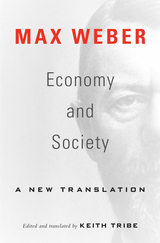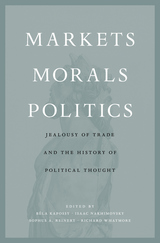
The definitive new translation of Max Weber’s classic work of social theory—arguably the most important book by the foremost social theorist of the twentieth century.
Max Weber’s Economy and Society is the foundational text for the social sciences of the twentieth and twenty-first centuries, presenting a framework for understanding the relations among individual action, social action, economic action, and economic institutions. It also provides a classification of political forms based upon “systems of rule” and “rulership” that has shaped debate about the nature and role of charisma, tradition, legal authority, and bureaucracy.
Keith Tribe’s major new translation presents Economy and Society as it stood when Weber died in June 1920, with three complete chapters and a fragment of a fourth. One of the English-speaking world’s leading experts on Weber’s thought, Tribe has produced a uniquely clear and faithful translation that balances accuracy with readability. He adds to this a substantial introduction and commentary that reflect the new Weber scholarship of the past few decades.
This new edition will become the definitive translation of one of the few indisputably great intellectual works of the past 150 years.

When István Hont died in 2013, the world lost a giant of intellectual history. A leader of the Cambridge School of Political Thought, Hont argued passionately for a global-historical approach to political ideas. To better understand the development of liberalism, he looked not only to the works of great thinkers but also to their reception and use amid revolution and interstate competition. His innovative program of study culminated in the landmark 2005 book Jealousy of Trade, which explores the birth of economic nationalism and other social effects of expanding eighteenth-century markets. Markets, Morals, Politics brings together a celebrated cast of Hont’s contemporaries to assess his influence, ideas, and methods.
Richard Tuck, John Pocock, John Dunn, Raymond Geuss, Gareth Stedman Jones, Michael Sonenscher, John Robertson, Keith Tribe, Pasquale Pasquino, and Peter N. Miller contribute original essays on themes Hont treated with penetrating insight: the politics of commerce, debt, and luxury; the morality of markets; and economic limits on state power. The authors delve into questions about the relationship between states and markets, politics and economics, through examinations of key Enlightenment and pre-Enlightenment figures in context—Hobbes, Rousseau, Spinoza, and many others. The contributors also add depth to Hont’s lifelong, if sometimes veiled, engagement with Marx.
The result is a work of interpretation that does justice to Hont’s influence while developing its own provocative and illuminating arguments. Markets, Morals, Politics will be a valuable companion to readers of Hont and anyone concerned with political economy and the history of ideas.

In the decades since the end of the Second World War, the unification of Europe has been a subject of enormous importance and tension to politicians, citizens, and scholars. Yet lacking the basic demographic, economic, and social data that would provide a fuller picture of what this integration will involve, the debate has produced more heat than light.
This book, the most comprehensive single-volume source of information available on the social and economic transformations in Europe over the past hundred years, fills that critical gap in our knowledge. In its pages we find examinations of population trends (including growth, mortality, national and international migration, and fertility), social structures (work, income, lifestyle, consumer patterns, welfare programs), and economic structures (agriculture, industry, and services), and an integrative overview of changes in both the organization of the economy and the role of the state in economic management. Paying particular attention to the period since 1950, the authors summarize the developmental paths of the four socioeconomic regions of Europe.The data and analyses provided here make this book an invaluable resource to professionals and scholars in a wide range of fields, from history, politics, and economics to journalism and international business.
READERS
Browse our collection.
PUBLISHERS
See BiblioVault's publisher services.
STUDENT SERVICES
Files for college accessibility offices.
UChicago Accessibility Resources
home | accessibility | search | about | contact us
BiblioVault ® 2001 - 2024
The University of Chicago Press









